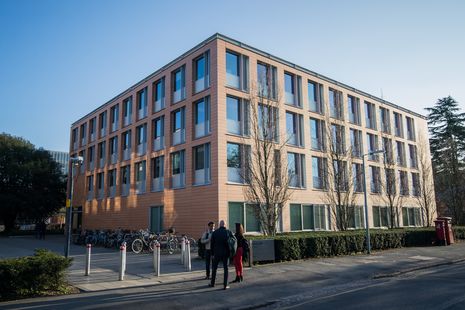English Faculty to ‘diversify and decolonise’ as students express ‘disappointment’ over issues of racism
The Faculty of English has outlined existing and forthcoming changes as students “condemn structural anti-blackness and racism” in the Faculty

The Faculty of English has outlined the steps it is making to ‘decolonise’ after a student-led open letter (26/06) urged the Faculty to address “anti-racist concerns.”
The open letter, which made four demands, attracted nearly 400 signatures. The vast majority of these were from students and alumni. Only one signatory held a position at the University.
The first demand called upon the Faculty “to publicly and resoundingly acknowledge and condemn structural anti-blackness and racism in the Faculty,” in reference to the lack of a single Black lecturer in the Faculty.
Nationally, the number of Black academics in top university roles is described as “officially zero”, prompting former universities minister Chris Skidmore to say the situation is “unacceptable.”
The Faculty responded that “we are highly conscious that we are insufficiently diverse. We are trying to do all that is in our power to remedy it.” They emphasised the Faculty’s “clear, unambiguous commitment to ensuring that all staff and students use language that is respectful to all kinds of identity and difference.”
Last year, a second-year PhD student quit the Faculty after a lecturer read out racial slurs in class. The student also cited deeper issues of “structural inequality” inside the University.
The second demand of the open letter was “to take further and more concrete action on decolonising the tripos”. Three years after calls to decolonise the curriculum were first made, the open letter alleges that students are “actively discouraged” from writing on race and that it is “possible to go through the tripos without studying a single writer of colour.”
“The general response has been one of inaction,” the open letter claims.
The Faculty challenged this by pointing out that the Faculty Library has “decolonised the library’s collections” and that “most individual paper reading lists have been revised to draw particular attention to the historical presence of writing and cultures other than those represented by the traditional canon of white authors.”
The Faculty stated that it was “dismayed to hear student feedback of cases where a supervisor has told a student that race is not a worthy topic.”
According to the Faculty, evidence of students’ engagement with race and empire was the range of undergraduate dissertation topics, which included Kanye West, Gil Scott-Heron and Black masculinity.
The open letter’s third demand was that the Faculty “actively mitigate the obstacles posed by decentralisation.” The University’s decentralised structure, wherein Colleges have different procedures, is often raised as a reason which prevents anti-racism measures from being enacted across the University. The letter requested that the Faculty “clarify what steps have been taken”, proposing that they have “a duty to the student body to hold its members accountable.”
In response, the Faculty affirmed that “it remains the case that the Faculty and colleges are distinct institutions.” However, they expressed their intention to “work with colleges” where complaints and concerns are raised.
Answering the open letter’s final demand – “to implement mandatory anti-racist and implicit bias training for Faculty staff” – the Faculty stated that 80% of its staff had taken online training on equality and diversity. Though not yet at a Faculty level, they committed to ensuring all members take the anti-racism training which is offered by the University.
The Faculty’s statement concludes with the assertion that “there remains a great deal more to do,” but expresses their “determination and continued effort to reform.”
They add their support of faculty member Professor Priyamvada Gopal, who has experienced racist threats and abuse since tweeting “I’ll say it again. White Lives Don’t Matter. As white lives” and “abolish whiteness”.
The open letter to the English Faculty follows an open letter by the CUSU BME campaign addressed to Vice-Chancellor Stephen Toope. The letter attests that “words count for very little if they are not met with practical solutions that have the welfare and better treatment of students and staff at their heart”.
If you have been affected by any of the issues raised in this article, the following information and support is available:
- Mind: A mental health charity providing free online resources.
- Samaritans: A 24-hour mental health helpline.
- The Black, African and Asian Therapy Network: A list of free services available across the UK.
- Ways To Help: A collection of resources, including petitions and bail funds, compiled by Black Lives Matter.
- Learn To Be An Active Bystander: Learn how best to challenge antisocial and discriminatory behaviour on campus.
- CamQuaranchats Podcast: The most recent episode of the CamQuaranchats podcast where students talked about their experiences of institutional racism at Cambridge.
 News / Fitz students face ‘massive invasion of privacy’ over messy rooms23 April 2024
News / Fitz students face ‘massive invasion of privacy’ over messy rooms23 April 2024 News / Cambridge University disables comments following Passover post backlash 24 April 2024
News / Cambridge University disables comments following Passover post backlash 24 April 2024 Comment / Gown vs town? Local investment plans must remember Cambridge is not just a university24 April 2024
Comment / Gown vs town? Local investment plans must remember Cambridge is not just a university24 April 2024 Comment / Does Lucy Cavendish need a billionaire bailout?22 April 2024
Comment / Does Lucy Cavendish need a billionaire bailout?22 April 2024 Interviews / Gender Agenda on building feminist solidarity in Cambridge24 April 2024
Interviews / Gender Agenda on building feminist solidarity in Cambridge24 April 2024






